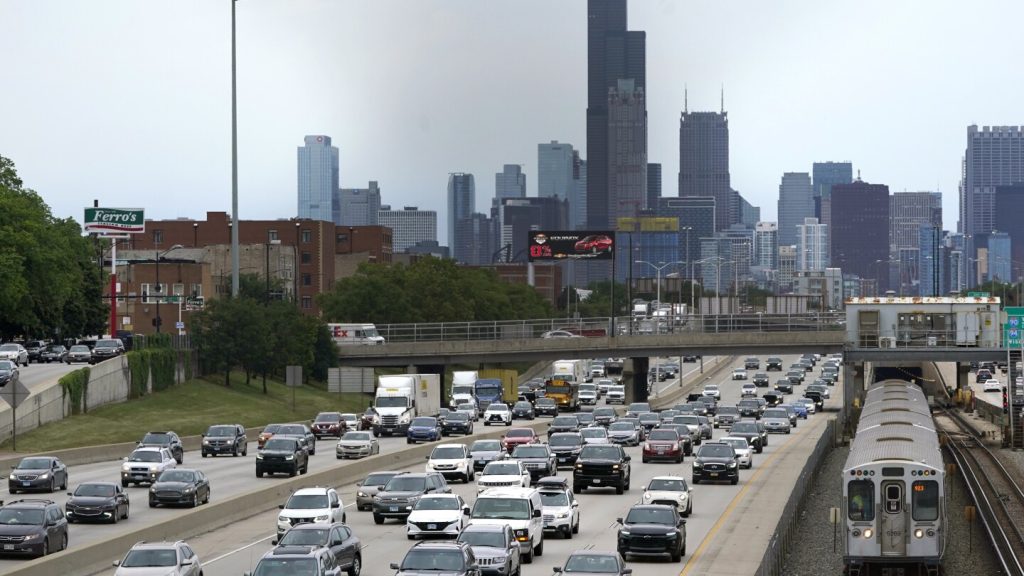NEW YORK (AP) — July 4 is fast approaching, and the influx of travelers is already intensifying.
Millions of Americans are preparing to head out of town during the upcoming holiday week. That will likely mean busy roads, as well as crowded airports and train stations.
The AAA automobile club predicts that some 70.9 million travelers will travel 50 miles or more from home during a nine-day travel period for Independence Day, surpassing pre-pandemic numbers for the American holiday. And the Transportation Security Administration expects to project More than 32 million people visited airports from Thursday to July 8, an increase of 5.4% compared to last year's figures.
Traveling for the 4th of July? Here's a rundown of what you need to know.
When is the best time to hit the road for the 4th of July?
Traveling safely during the holidays is never a sure thing. But avoiding the busiest times, when others are rushing out of town, is a good way to start.
If you're traveling by car for the Fourth of July, it's best to hit the road in the morning, according to INRIX, a transportation data and insights provider. Peak traffic congestion times vary by location, according to INRIX data released by AAA, but the worst times to drive on or before the Fourth of July are typically between 2 p.m. and 7 p.m. Either way, be prepared for traffic to be congested.
“Car travel during the holiday week could take up to 67% longer than normal,” Bob Pishue, transportation analyst at INRIX, said in a prepared statement.
This year, July 4 falls on a Thursday, and many travelers will likely take Friday, July 5, off to extend their trip into a four-day weekend. Drivers in major metropolitan areas can expect the biggest delays on Wednesday, July 3, and Sunday, July 7, when travelers are leaving and returning to the city, Pishue added.
And if you rent a car before July 4, the busiest pick-up days will be the Friday, Saturday and Wednesday before the holiday, AAA notes.
When will airports be busiest?
Airports will likely be crowded throughout the week, but the TSA expects most people to fly on Friday.
The agency expects to screen more than 3 million people on Friday, which would surpass the agency's current record for the most people screened in a single day. which reached just under 3 million last Sunday.
“We expect this summer to be the busiest in our history,” TSA Administrator David Pekoske said, adding that travel typically peaks around Independence Day.
Last year, the busiest day for air travel on the Fourth of July was also the Friday before the holiday, according to TSA data. If past trends hold, travel will likely be higher on the days before and after the Fourth of July, especially as the weekend approaches. In 2023, for example, more than 2 million people were screened on the Fourth of July, which fell on a Tuesday last year, compared with 2.88 million on the Friday before.
What should I do if my flight is delayed or cancelled?
Flights can be delayed or cancelled for a variety of reasons, ranging from aircraft-specific mechanical issues to severe storms affecting popular travel routes.
If your flight is cancelled, airlines are required to refund customers, even if the cancellation is due to weatherDelays are trickier because they usually have to meet certain criteria to be resolved, such as a refund or compensation, but carriers often give customers the option to change flights, if available, at no cost.
In April, the Biden administration published the final rules which include requiring airlines to provide automatic cash refunds within a few days for canceled flights and “significant” delays. Those rules are expected to go into effect over the next two years, but the Department of Transportation has a website that allows consumers to view the commitments made by each airline for refunds and coverage of other expenses when flights are cancelled or significantly delayed.
Always check your route before leaving home
It’s better to stay home than to be stuck in traffic for hours or in an airport terminal. Before you hit the road this holiday week, do yourself a favor and check the status of your travel plans.
Was your flight, train or bus delayed? Are there traffic incidents that could disrupt your journey? And what about the weather? A quick glance at your itinerary (for example, travel updates on a carrier’s website), checking the weather forecast and tracking road safety through services like the 511 hotline or your phone’s navigation apps can go a long way to avoiding travel hassles.
Here are some additional tips to keep in mind:
— Leave early: There are more people everywhere during a holiday week, so the lines will be longer and the roads will be busier. Allow extra time to get to your destination or to get through security at the airport.
— Keep an eye on the weather, not just at your destination: check the weather along your entire route. Even if it’s sunny both where you live and where you’re traveling, it’s important to keep an eye out for storms that could come in between. You may need to adjust your route.
— Be forgiving: A trip delay or cancellation can be frustrating, but if you’re experiencing disruptions, chances are others are too. Customer service agents have a lot on their plate this time of year, and it’s important to be patient and respectful when they’re trying to help you.


